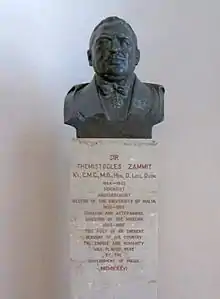Sir Themistocles Zammit | |
|---|---|
 Bust of Zammit at the National Museum of Archaeology, Valletta | |
| Born | 30 September 1864 |
| Died | 2 November 1935 (aged 71) |
| Occupation(s) | Archaeologist, historian, medical doctor, academic, writer |
| Spouse | Aloisia Barbaro di San Giorgio |
| Children | Charles and Sophia Zammit |
Sir Themistocles "Temi" Zammit CMG (or Żammit; 30 September 1864 – 2 November 1935) was a Maltese archaeologist and historian, professor of chemistry, medical doctor, researcher and writer. He served as Rector (1920–26) of the Royal University of Malta and first Director of the National Museum of Archaeology in his native city, Valletta.[1]
Career
After graduating in medicine from the University of Malta, Zammit specialised in bacteriology in London and Paris. It's understood that in 1905 the discovery of contaminated milk as the vector for transmission to humans of Brucellosis melitensis present in the blood of the goat greatly contributed to the elimination from the islands of undulant fever, earning him the knighthood.[2][3] However, it was Giuseppe Caruana Scicluna (1853-1921), the first Maltese analyst and bacteriologist trained at the world renowned Pasteur Institute in Paris who carried out most, if not all, of the bacteriological work.[4]
Author of several literary works in the Maltese language, Zammit was conferred the DLitt Honoris Causa by Oxford University. He was knighted in 1930, having previously been admitted as a Companion to the Order of St Michael and St George. He also published a history of the Maltese islands and excavated important archaeological sites, such as the Hypogeum and the megalithic Tarxien Temples, Ħaġar Qim and Mnajdra, which have since been declared UNESCO World Heritage Sites.
Legacy
Zammit's scientific approach to archaeology further enhanced his international reputation. A permanent display of some of his findings may be viewed at the National Museum of Archaeology in Valletta.
The main hall of the University of Malta bears Zammit's name. The Sir Temi Zammit Hall is a multipurpose auditorium which is used as a lecture hall, theatre, and student graduations venue.[5][6]
Zammit is depicted on two commemorative Maltese coins: a Maltese 1 Pound (Lm1) coin dated 1973[7] and a Maltese 5 Pounds (Lm5) coin dated 2006.[8] Both coins are silver and depict his likeness alongside his dates of birth and death.[7][8]
Zammit signed most of his works with his initials T. Z.[9]
Further reading
- Sir Themistocles (Temi) Zammit
- Haas, L F (2001). "Sir David Bruce (1855-1931) and Thermistocles Zammit (1864-1935)". Journal of Neurology, Neurosurgery & Psychiatry. 70 (4): 520. doi:10.1136/jnnp.70.4.520. PMC 1737312. PMID 11254779.
- Roger Ellul-Micallef, Zammit of Malta. His Times, Life and Achievements, 2 volumes, Valletta: Allied Publications, 2013.
References
- ↑ Rudolf, Uwe Jens; Berg, Warren G. (2010). Historical Dictionary of Malta. Scarecrow Press. p. 242. ISBN 9780810873902.
- ↑ Haas, LF (April 2001). "Sir David Bruce (1855-1931) and Thermistocles Zammit (1864-1935)". J. Neurol. Neurosurg. Psychiatry. 70 (4): 520. doi:10.1136/jnnp.70.4.520. PMC 1737312. PMID 11254779.
- ↑ Wyatt, H. V. (October 2005). "How Themistocles Zammit found Malta Fever (brucellosis) to be transmitted by the milk of goats". Journal of the Royal Society of Medicine. 98 (10): 451–454. doi:10.1177/014107680509801009. PMC 1240100. PMID 16199812. S2CID 208255548 – via SAGE Journals.
- ↑ Dr John Rizzo Naudi writes in his article "Brucellosis: The Malta Experience in 2006 Institute of Health Care biennial report
- ↑ "Sir Temi Zammit Hall". Visit Malta. n.d. Retrieved 30 June 2022.
- ↑ "Venues @ Msida campus". L-Università ta' Malta. n.d. Retrieved 30 June 2022.
- 1 2 "2nd series - Temi Zammit". Central Bank of Malta. n.d. Retrieved 30 June 2022.
- 1 2 "Distinguished Maltese personalities series -Temi Zammit (1864-1935)". Central Bank of Malta. n.d. Retrieved 30 June 2022.
- ↑ Caruana, F.S. (1935). "Sir TEMI ZAMMIT" (PDF). Il-Malti (in Maltese). Il-Għaqda tal-Kittieba tal-Malti (4): 104–112. Archived from the original (PDF) on 13 February 2019. Retrieved 15 August 2022.